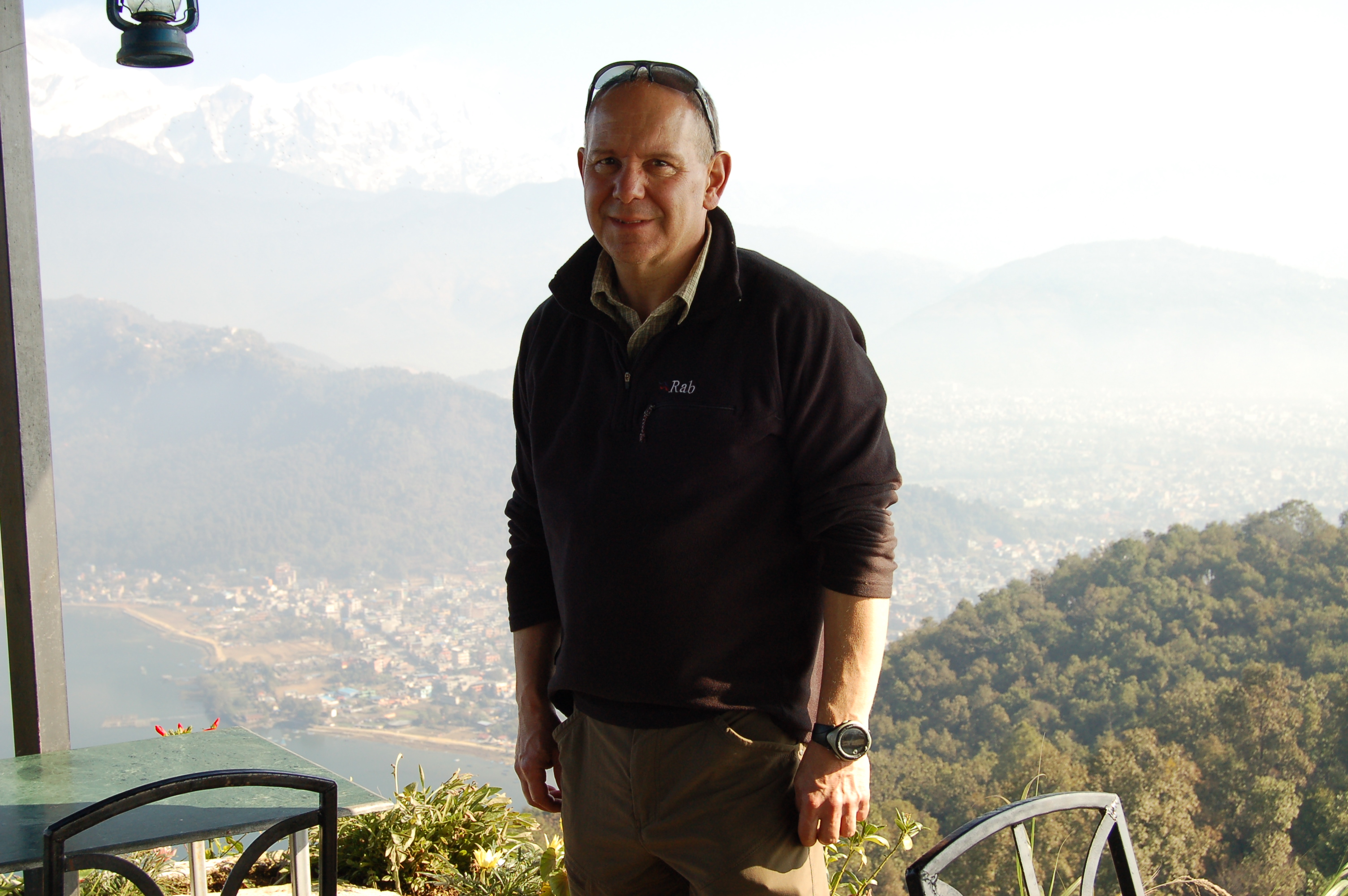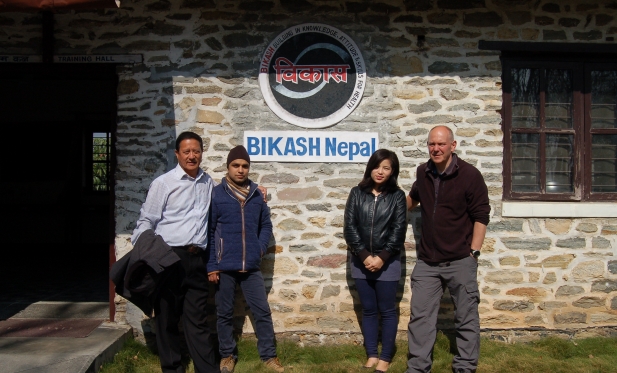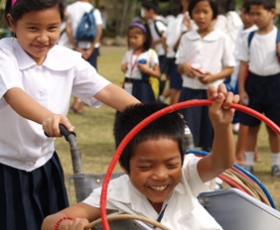Name
Malcolm (ACCA)
Day job
Int. Financial Consultant
Assignment

After a long and successful career in the private sector, Malcolm wanted a change of scene and a change of sector. He discovered AfID via an internet search and was intrigued as to whether his finance skills were transferrable - It wasn’t long before he had booked himself onto the next capacity-building workshop in London. The thought of utilising his finance skills acquired through ACCA qualification to give back by volunteering overseas was something Malcolm was very passionate about pursuing and, after talking with AfID’s experienced programmes team, he soon found himself on a flight to Nepal to support a local NGO. Bikash Nepal is a sustainable resource centre aimed at providing appropriate health care, rehabilitation and socio-economic services to marginalised people - particularly those with leprosy, disabilities, HIV/AIDS and tuberculosis. Malcolm’s time in Nepal gave him a taste for working in the development sector and soon after he returned to the UK he started his search for salaried roles. He was offered a contract role at Leonard Cheshire Disability (LCD) in London, where he still works.
AfID caught up with Malcolm to find out about his experiences and to see how important volunteering was in his career change…
AfID caught up with Malcolm to find out about his experiences and to see how important volunteering was in his career change…
Can you tell us a little about your current role in LCD and how it differs to your last position with SARL Shape Solutions?
I am undertaking a comprehensive review of the controls and financial performance surrounding Leonard Cheshire’s International development work; this has involved conducting a review of the previous practices and procedures, recommending changes and then working with the finance team to implement an improved reporting and control environment.
The role is not dissimilar to some of the consulting assignments I have previously undertaken; however the challenge is the remoteness of the project delivery partners and the number and locations involved in the processing of the financial information. The key element is to ensure the control of funds and that accurate financial information is gathered from the activities taking place in remote areas of Africa and Asia.
At LCD I attend the office everyday which is a change from many consulting roles where I have often undertaken much of the assignment remotely. It provides a refreshing opportunity to work more closely with people. In my current role I don’t have a regular monthly cycle of tasks to undertake so it helps to be self-motivated and project management drives the day to day focus of work being undertaken.
Many accountants worry about the transferability of their skills when moving to a new country and sector; have you found any specific experience from your past roles have been particularly relevant?
I feel that the concern about transferability is somewhat overstressed, the basic accounting skills are utilised across the board and there is a tendency to underestimate just how much we know. Working with accounting systems, workbooks, budgeting, forecasts, accurate reporting, controlling funds and governance are all part of our expertise and these are applicable to all organisations.
In transferring to the charity sector I have had to understand the application of FRS 5 and the Charities SORPs 2005 and 2015, but these are essentially elements of CPD and the general need to adapt to the different sectors.
I have always travelled on business, including secondments which involved living abroad for periods of up to a year. I am therefore perhaps more familiar with different cultures and the need to be aware of local regulations and practices than many people.
This and undertaking the voluntary assignment to Nepal prepared me well for the transition to the international development sector and one important lesson was not to assume that accounting skill levels are the same everywhere. One enjoyable element of the work in this area is to be able to mentor and train staff in the field who undoubtedly apply themselves and are enthusiastic, but are perhaps not so skilled and experienced as one might find in some sectors and locations.
How easy was it to adapt to living and working in a different culture?
Personally I find that disturbing your comfort zone and embracing new experiences is very invigorating. I feel the international development sector provides a real feel good factor and good job satisfaction through helping people less fortunate than you.
When I have worked and lived abroad I have always sought to engage with and understand the local culture and for me the idea of living in an ex-pat community or staying in an international chain hotel is contradictory to living in another country. It always takes a couple of weeks to become comfortable with finding your way around your location and the “culture shock” of different sights and sounds, getting familiar with the local food and your daily routine, but you do adjust quickly and then that opens up the possibility to have memorable experiences.
Why did you choose to work in the International Development sector?
During my international travel I have seen first-hand the difficult conditions many people in the world endure and I had been minded to undertake some voluntary work for some time. At the end of 2013 I had just completed a project so looked at what was available in the sector and found AfID to be an ideal organisation to work with.
For those with family and career restrictions it may not possible to undertake voluntary work or spend time overseas; so working in the sector is a question of timing dictated by your own life and career situation. It is necessary to forgo some earning power to work in the sector when compared to the City, but I found myself in the fortunate position whereby I could utilise my experience and skills to, in some small way, benefit others which translate into rewards that are more fulfilling than monetary gain alone.
Do you feel your voluntary experience at Bikash, Nepal, helped you gain this role and prepare for life in your new role?
Certainly; working with the people in Nepal was a very humbling experience and the dedication and kind heartedness of the staff at Bikash was inspiring. They forgo a lot to work for the benefit of others and the general living conditions was a wakeup call for how much I take for granted living in London and the assignment gave me an insight into the financial, staffing and operational constraints that NGOs have to contend with.
The voluntary work was worthwhile in its own right, but it was also important in securing the position at LCD as they were specifically looking for someone who had undertaken a voluntary assignment with AfID. Undertaking the voluntary assignment not only provided experience of how an overseas NGO operates but it is also demonstrated a commitment to work within the sector.
What would you say are the pros & cons of your decision to work in the sector?
The pros are the job satisfaction of feeling you are able to benefit others and working with amazing people. It is also provides a good lesson in working with limited resources.
The cons are working with those limited resources, which translate into lower pay, constraints on investment into systems and a general lack of spending money of finance and administration.
What ‘do’s and dont’s’ would you give to anyone thinking of travelling and working in a less developed country?
Do research before you go and plan accordingly. Try to learn a few words of the language even if it is only the ability to greet and thank people, this is always appreciated and will mean you people will engage with you more readily.
Whilst you will no doubt choose to go somewhere that appeals and interests you, you are there to work so factor in some time at the end of the assignment for your sightseeing.
Be open to new experiences and most importantly enjoy the adventure! Don’t go with preconceived ideas and prejudices.
What would be your advice to other accountants considering a similar career change or looking to break into the sector?
I am enthused and invigorated by the work I’m now undertaking and will certainly look to stay in the sector when my LCD assignment is completed, so I would wholeheartedly encourage others to enter the sector.
I would certainly advise undertaking a voluntary assignment as a first step; it will provide a good insight into the sector, whilst being worthwhile in its own right. One thing I would add is that whilst I was undertaking my voluntary assignment in Nepal I was staying with a family and working which gave me a very different view of the Country and culture than I would have had from visiting as a “tourist”.




